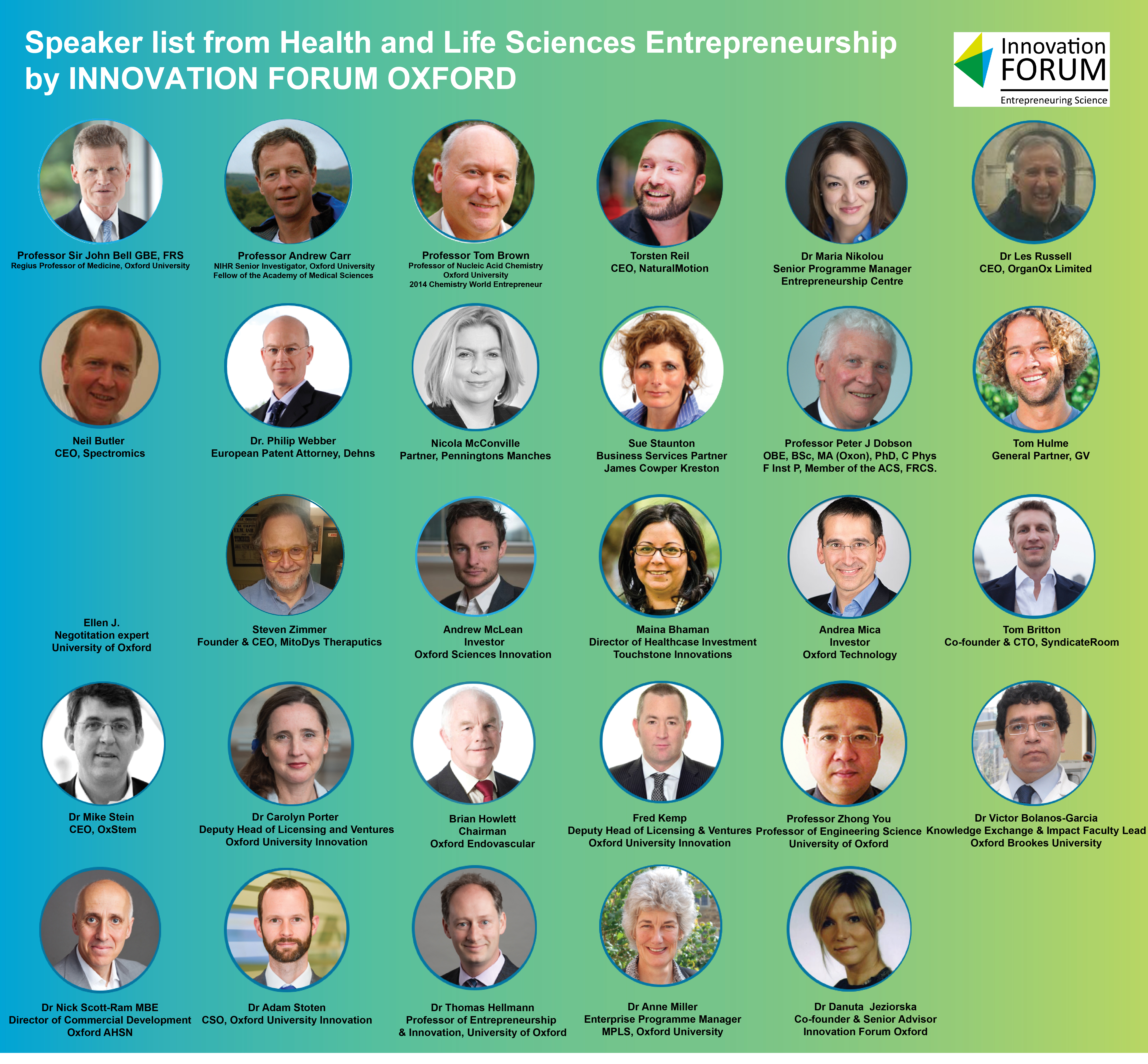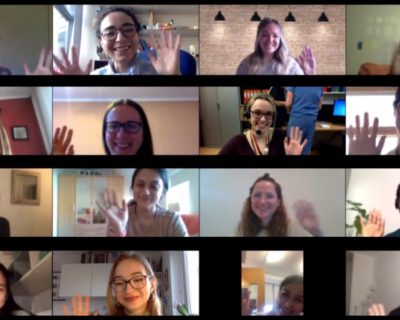Branch
Select your branch
How to become a science-entrepreneur? Innovation Forum Oxford training on health and life sciences entrepreneurship
Academics more and more often think beyond publishing their discoveries in top journals and consider the commercial potential of their findings. This is particularly prominent at the University of Oxford, where last year, scientists span out 21 discoveries into companies, attracting ~£50 million in early-stage funding grants, investment and partnerships with pharma. This year, start-up companies from the University have included subjects as diverse as a new approach to generate vaccines more quickly, cheaply and effectively (SpyBiotech), an echo machine learning assay to diagnose heart disease (Ultromics), a way of creating the next generation of high performance alloys (OxMet) and a new broadcast personalisation engine (Covatic). However, a large potential of academic research is still untapped and interest in entrepreneurship within life-sciences is being championed at a national level, highlighted by the recent publication of the Life Sciences Industry strategy by Prof Sir John Bell.
How then, can we ensure that more scientists engage in entrepreneurship to enhance translation-driven culture within academia? The Innovation Forum Oxford have begun to address this need locally by hosting a series of lectures on Entrepreneurship in Health and Life Sciences that equipped academics with a basic toolkit on HOW TO commercialise their science based ideas. The lectures spanned a period of 8 months and drew overwhelming interest from the local community by attracting 560 attendees from academia, the NHS, local entrepreneurs and industry experts.
The lecture series was opened by Professor Sir John Bell, who introduced the innovation landscape of Oxfordshire. Sir John highlighted Oxford University’s position as a world-leading University in Biomedical Sciences, the success stories of Oxford unicorn companies and the expanding infrastructure to support innovation within the region, leaving the audience eager to engage and follow in the steps of previous successful academic entrepreneurs such as Bent Jakobsen (founder and CSO of the billion-dollar company Immunocore).

During the next lecture, the audience was inspired by three successful innovators: Torsten Reil, Prof Andrew Carr and Prof Tom Brown. Torsten Reil, described how his PhD research on evolutionary biology and neuroscience inspired the technology behind his cutting-edge gaming company NaturalMotion that he sold in 2014 for ~$500 Million. Prof Andrew Carr, director of the NIHR Oxford Musculoskeletal Biomedical Research Unit, told us about his research into novel materials as scaffolds for repairing joints. Finally, Prof Tom Brown, author of 300 publications and Chemistry World Entrepreneur 2014, told us how he successfully leads his research group at Oxford University whilst also translating his findings into start-up companies.
Afterwards, the lectures focused on “HOW TO” and covered the key aspects of commercialisation. Dr Maria Nikolou (Senior Programme Manager, the Entrepreneurship Centre, Said Business School) and Dr Les Russell (Chief Executive Officer, OrganOx) introduced the business tools to develop and assess the impact and tangibility of a business. Dr Nikolou covered the theory and together with Dr Russel evaluated OrganOx using the “Lean Canvas” model to show how these tools can be used in practice. Next, the audience learned how to define a target market from Neil Butler (Director of Spectromics), the basics of business finance with Sue Stanton (Partner and Head of Technology at James Cowper Kreston LLP) and how to write a business plan from Professor Peter Dobson OBE. A very important talk on intellectual property and how to determine whether a novel diagnostic device, computational algorithm, laboratory reagent or gene sequence is patentable, was covered by Dr Philip Webber (European Patent Attorney – Dehns Patent & Trade Mark Attorneys).
Given the audience now had the necessary tools to develop their business plan, they next learned how to pitch ideas to investors from a serial entrepreneur with extensive experience in business and investment, Tom Hulme (General Partner, GV). Tom, who has personally invested in 21 companies as an angel investor, spoke on how to craft a great pitch and covered the key ingredients for success when meeting face to face with investors.
This was followed by a panel discussion on how to raise capital with top representatives from the UK crowd funding platform, university-linked funds, local Oxford-based investors, an entrepreneur and an international VC. Andrew McLean (Lead Life Sciences Investor, Oxford Sciences Innovation), Maina Bhaman (Director of Healthcase Investment, Touchstone Innovations), Dr Mike Stein (CEO, OxStem), Tom Britton (Co-founder and CTO, SyndicateRoom) discussed the basics of how to approach different types of investors, what to ask for, what to give away and how to select the best investor for you and your business. We then prepared our audience on how to negotiate and create high value sustainable deals by inviting a well-recognised expert in business negotiations, Ellen J (Said Business School).
Next, the lecture focused on how ideas are commercialised within the University setting. Dr Fred Kemp and Dr Carolyn Porter from Oxford University Innovation (OUI), the tech-transfer office, teamed up with scientific founder Prof Zhong You and the chairman Brian Howlett of Oxford Endovascular to demystify the process of translation and highlight the support from OUI provided to academics in the journey of spin-out creation.
Finally, the lecture series closed with a panel discussion on the support for innovation within the Oxford entrepreneurial ecosystem, chaired by Dr Danuta Jeziorska (Co-founder and Senior Advisor of Oxford branch of Innovation Forum). The representatives from key innovation stakeholders, included Dr Adam Stoten (COO, Oxford University Innovation), Dr Victor Bolanos-Garcia (Knowledge Exchange and Impact Faculty Lead, Oxford Brookes University), Dr Thomas Hellmann, (Professor of Entrepreneurship and Innovation, University of Oxford), Dr Nick Scott-Ram MBE, (Director of Commercial Development, Oxford Academic Health Science Network) and Anne Miller (Enterprise Programme Manager, MPLS Enterprise). Each explained how their teams nurture the entrepreneurial ecosystem locally by providing a wealth of expertise and experience and an invaluable network of specialists and investors that help turn the challenge of building a business into a realistic possibility.
Over the period of 8 months, attendees were provided with the key tools necessary to take an idea from the lab and transform it into a sustainable business. To further foster individuals with ideas, Innovation Forum Oxford is now hosting an accelerator programme (called IMAGINE IF!) that provides face to face mentorship and non-dilutive capital to the winner of the global competition. Find out about the 10 best ideas from the Oxford region.
Innovation Forum Oxford knows that there is no better way of learning entrepreneurship than by DOING IT. Thus, stay tuned with our website oxford.inno-forum.org as we are going to launch a further series on workshops on commercialisation at the start of 2018.
To learn more about the team of talented entrepreneurially minded scientists and clinicians from the University of Oxford and Oxford Brookes University, who have organised this initiative visit.
________
The health and life-sciences lecture series was organised in collaboration with the MRC Weatherall Institute of Molecular Medicine and supported by main stakeholders within Oxfordshire entrepreneurial ecosystem: the Medical Science Division from the University of Oxford, Oxford University Innovation, the Said Business School, Enterprising Oxford, Oxford Academic Health Science Network, Oxford Biomedical Research Centre, Oxford Brookes University; and by global and local Innovation Forum Partners: JnJ Innovation, George James ltd, orangefield group, Pennington Manches and James Coper Kreston, White October, Dehns, respectively.
-
Pingback: DEVELOPING THE NEXT-GENERATION OF SCIENCE-ENTREPRENEURS | Oxford
-
Pingback: MEET THE OXFORD TEAM OF INNOVATION FORUM | Oxford


